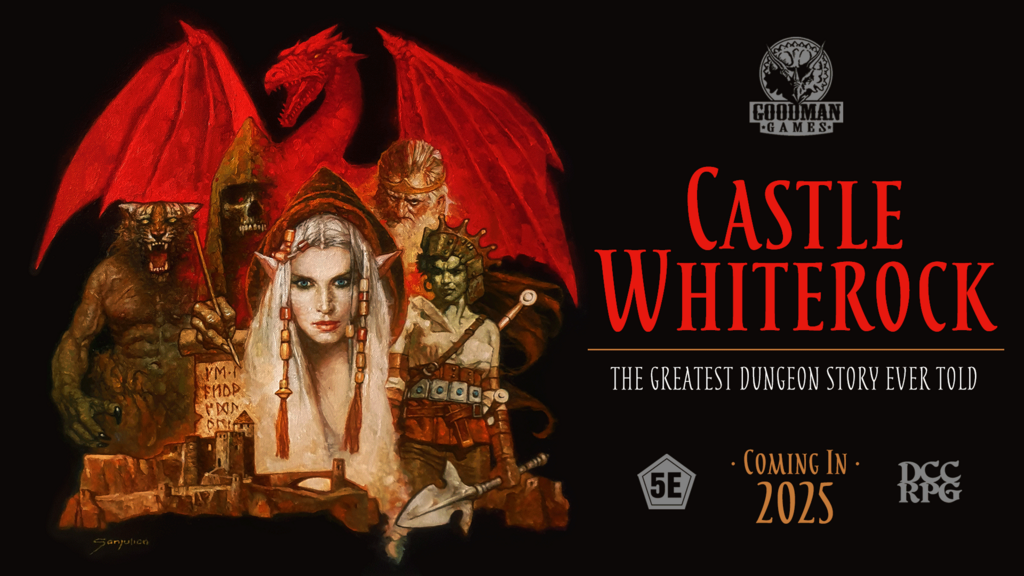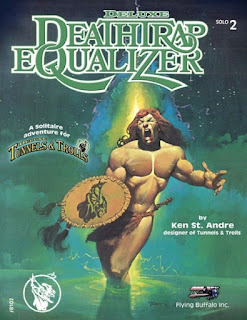On the 5E side of the world, I play Tales of the Valiant, just to have a 5E game that isn't from Wizards. But the 5E side of the hobby is horrible right now, and I get the feeling the game is like watching passengers flee to the lifeboats. More of the D&D team is leaving, Daggerheart is taking a considerable portion of the D&D storytelling community away, Shadowdark is taking the old-school 5E crowd, and Draw Steel (MCDM RPG) is hitting PDF very shortly to draw in the game mechanics fans.
The "modern gaming world" is a mess, and I can see why people are quitting and moving on to other hobbies. Daggerheart is more about keeping people in the hobby than it is about taking them away from D&D. I have a feeling that most of them would have left for other pursuits.
The world is better over in OSR-land, trust me.
We have games. They work. They don't change. They are fun. And they don't need a website to figure out a character sheet. There are no fights with them. People don't need to patch broken classes. Nobody is telling you which version to play.
The OSR is 100% more sane than the 5E world.
It is calm and stable. Quiet, almost, but people play everything, so it is a fantastic place.
Old School Essentials (OSE) is our Shadowdark. This game and Shadowdark are equally impressive, with OSE being just as fun, with many more options, monsters, spells, and rules for an authentic old school experience. This isn't 5E, but it doesn't matter. This is more of a traditional RPG than Shadowdark, since it can be played turn-by-turn, but it is not as tightly linked to a map or movement. OSE also scales to a higher power level, with dominion play, which is very fun.
Many shift between Shadowdark and OSE, and the games complement each other well.
Just like Shadowdark, I can play this without worrying about builds, drama, version wars, finding a character sheet builder, or any other modern corporate-inflicted inconvenience. How many dollars a month am I paying to support ToV character sheets in Shard? I sigh and shake my head. The 5E market can feel like one massive scam on gamers.
And Shadowdark is our Shadowdark.
Shadowdark is enormous, even first-time Kickstarter projects are raking in tens of thousands of dollars. This is a well-crafted third-party scene, featuring a unique style and look that aligns with the books, a focus on simplicity, and a bare-bones presentation that meets old-school sensibilities with 5E rules that strike a sweet spot for many players. Shadowdark belongs in the OSR, and it is the gateway game into our world for many 5E players.
This is a fantastic game, full of the best advice for playing and running the game, filled with content generation tables, and it boils down the essence of old-school gaming to its purest form.
Swords & Wizardry is so good. This is just a classic system, a true, "one and done" set of rules. This is like a classic, pre-first edition set of rules, as easy as B/X, but full of AD&D goodness. The fighters in this game are some of the best in the OSR, and the game is not afraid to pare back those ability score bonuses. Every +1 matters. The saving throw system is genius, and you are never saving versus oddly specific and obscure categories of minutia. Save versus wands? Isn't that a magic save?
One save system, with special modifiers, and you can even use ability score modifiers if you feel they apply. How do you roll ability checks? Old-school gaming was more "the referee decides" on everything. You can "just say pass/fail" or "roll a d20 or under." A STR 18 fighter and a standard indoor door? No roll needed, it shatters into splinters. Why? Because it would.
Whatever the check is or isn't, it is.
Another game that's so good it hurts is Castles & Crusades. This game kills all interest in 5E for me. This is the mythical 2.5E we never got, sort of a "What if Wizards never bought D&D", ruleset that advances the art, yet feels exactly like its AD&D inspirations.
This game is even more rules-light than Daggerheart, and it does not need all the narrative scaffolding since, in the old days, we did all that ourselves with our minds. It is highly expressive, though, with a save and skill system equally as genius as Swords & Wizardry.
This game is worthy of running any mid-1990s D&D setting perfectly, from Dragonlance to the Forgotten Realms. Ravenloft. Dark Sun. It does stories as well as dungeon crawls.
This game can be modded to be as super heroic as 5E, or as deadly as old-school D&D. The range and variety of character types blow my mind, and multiclassing in this game is way better than 5E.
This is also the last game that Gary Gygax was involved with in his life. That is a seal of approval that holds value.
Dungeon Crawl Classics is fun. The game has piles of dice, some of the most inspirational and amazing art ever put in a book, and it worships at the golden altar of Appendix N as if it were some lost god of an ancient world lost to time. It is equal parts deadly and insane, fast-playing, with humor and terror in equal parts, where death can lurk around any corner, but magic can crack the earth and forge canyons that shall last a million years.
Some in the old-school community view this as a game written to appeal to the audience, but not one that truly holds old-school values in high regard. This is not an exploitative cash grab for the old-school crowd; it is a wake-up call to share the old-school feeling and culture with the current generation. Yes, this is a tribute band to 70s and 80s rock, a more modern 3.5E-style ruleset, but damn are they good at what they do.
This is the scream at the beginning of the Judas Priest song, Screaming for Vengeance. It is a piercing shriek, a spear in the heart of the modern day, and a callback to the hippie van, bong-smoking, and neon felt poster crowd of the late 1970s. Like Mork Borg, this game serves as a wake-up call to a hobby that has lost its way and forgotten the true spirit in which the hobby was born.
DCC is not a plush gold-tasseled theater game or silly-voiced anthropomorphic cosplay.
It is a sweat-covered, boot-in-the-face, dagger in the back, and lightning through my enemy's heart grab for glory.
And dying is a part of the legend.
When you roll 3d6 down the line, you accept that your character shall someday die. Add a checkbox to the character sheet that indicates this, and have everyone mark it to begin play. Now, how shall you live that life? Shall you grab victory from the heart of death? Will you embrace darkness for the promise of power? Shall you guard the weak and raise your holy sword high to become the beacon of light to all of civilization? Or shall you be the conqueror to sit upon a throne of your enemy's skulls?
Sudden and shocking instant death, climbing to the heights of glory, and standing on top of a pterodactyl with a laser rifle, slaying the devil-worshipping orcish hordes as you fly into the demon-filled volcano, with Megadeath, Iron Maiden, and Manowar playing at maximum volume.
Adventures Dark and Deep is the pinnacle of first-edition gaming. Swords & Wizardry comes close, but this game has all the arcane tables with strange percentages and modifiers, which you record in a character sheet that looks like a spreadsheet filled with arcane die roll modifiers for all sorts of situations. This does the first-edition initiative right, with weapon speeds and casting times in phases. The monster book is voluminous, with all the greats.
This is the only game that could ever do Greyhawk justice. You cannot play Greyhawk as it was back in the day with 5E. Even the Forgotten Realms was originally a first-edition world, more serious and low-magic, with death at every turn. Wizards' D&D turned everyone into superheroes who do not die. That makes modern rules incompatible with the original settings.
The new settings are a science-fictional and contemporary reimagining of the classic settings in the classic books. It comes across as if putting starships and blaster rifles in The Lord of the Rings, and forcing everyone to accept that as how the books were originally intended.
To paraphrase Will Smith, "Get your modern crap out of my classic games!"
There are plenty of modern games that do that. People who wish to return to the classics should have the freedom to read and interpret them as they were, from the original words and source material. If modern writers keep reinterpreting this source material, and we lose access to the originals, how are we supposed to create something new, inspired by the original works? We should have the same rights and freedoms as the current writers had to play the original settings, with the original rules, to find our own truths about them.
OSRIC is a strong alternative to AD&D, and a third edition is forthcoming, without the OGL and with free-to-publish content rights for all time. This is equally worthy, and just as classic and iconic.
The argument to play first edition is not "wanting to play an old game," but it is more "we have the right to not live in George Orwell's 1984, where we must accept the socially-approved reinterpretation." This is about preserving history and having the freedom to read and interpret it as we see fit. To have the same rights and liberties as today's writers do, before they are taken away by corporate revisionism.
Be careful about giving up all your rights to the collective; you will regret it someday.
From the frozen north comes the roar of Dragonbane. This is a revived game from the 1980s, D&D as played in Sweden, a local classic brought back to life in the modern day. Everything about this game is a classic, from the art to the design, it soars instead of flying, and is one of the best solo experiences in old-school gaming. Many have walked away from 5E and ended up here, and are swinging swords and casting spells against the backdrop of a war between demons and dragons.
Dragonbane is awesome.
Even 5E has spawned complete clones of the system within the Open 5E framework, immune from the OGL and forever protected from threats and license revocations. D&D could be sold to a totalitarian country, and the 5E rules would still be alive and well. The OGL Crisis was both a tragedy, but it also spawned a wave of freedom that we still benefit from today. Also in the modern framework, Pathfinder 2 deserves mention as a game that is now protected, open, and free from threat.
D&D hasn't died, but it is not in a great place. Time will tell if things get better. The game has spawned hundreds of alternatives, much like the blooming of flowers in a field, seeded with the blood of a game that started it all.









































